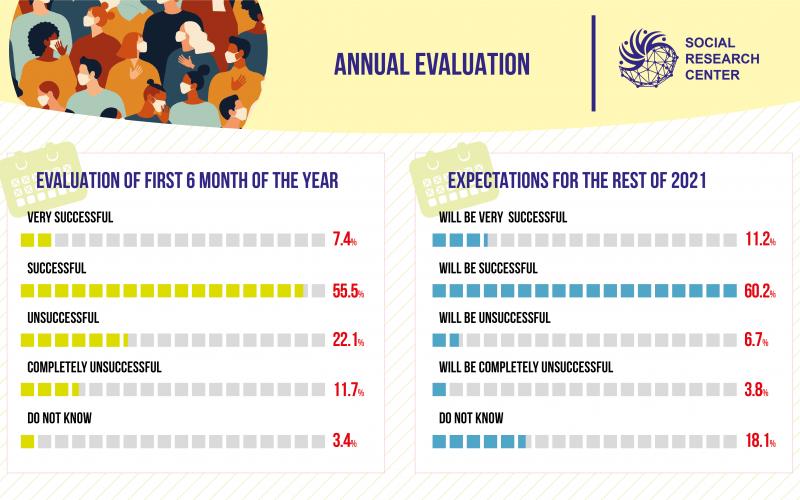The Social Research Center studied citizens’ attitudes to COVID-19 passports, vaccinations, regulations concerning weddings and funerals and personal assessment of the first six months of the year

Azerbaijan has lifted a number of restrictions imposed since early 2020 due to COVID-19. One of them is the reorganization of gatherings and ceremonies in the country, for weddings are allowed under certain conditions. Moreover, certain services have been made accessible to only those with COVID-19 passport (Immunity certificate).

The survey was conducted among 1072 respondents, covering Baku, Absheron-Khizi, Ganja-Dashkasan, Gazakh-Tovuz, Guba-Khachmaz, Sheki-Zagatala, Lankaran-Astara, Karabakh, Central Aran, Mil-Mugan, Shirvan-Salyan and Mountainous Shirvan economic-geographical regions.

Nakhchivan Autonomous Republic and the liberated regions were not included in the survey. Every third number in the sample frame was contacted the selected clusters. In case of refusal, an attempt was made to contact the next third number. 49% of respondents were men and 51% were women. In terms of age, those in the 37-54 age group are relatively dominant. The highest level of education of 50.7% of respondents is secondary education. The margin error is 3% in the 95% confidence interval.

The quantitative methodology was used in the research.
The survey included questions on three different topics;
- Attitude to the permission to hold festivities and participation in ceremonies
- Attitudes to vaccination and COVID-19 passport
- Personal evaluation of the first 6 months of the year
The survey was conducted on July 7-25, 2021. Calls were made between 10:00 and 21:00.
Block I. Attitudes towards vaccination and the requirement of a COVID-19 Passport (Immunity Certificate)
In addition to the questions about vaccination, the survey asked about the COVID-19 passport. For comparison, in the survey conducted between April 25 and May 18 this year, 30.6% of respondents reported having received both doses. The reasons given by 43.0% of unvaccinated respondents for not being vaccinated are different. It is noteworthy that a significant number of respondents (28.0%) said they would not be vaccinated under any circumstances. About 40.0% of retirees and 31.0%of housewives mentioned they would never be vaccinated. 19.0% of respondents said they would agree to be vaccinated only on a compulsory basis.
Block II. Evaluation and expectations for the first 6 months of the year
Respondents were asked how the past six months have been for them. For more than half of the respondents (63.0%), the past 6 months have been more or less successful, and for almost a third (33.0%) it has been unsuccessful. While 2020 was successful at varying degrees (70.2%) for two-thirds of the population, it was not so for the remaining. (29.8%)
The easing of pandemic conditions, the gradual revival in the labor market, the restoration of inter-city and inter-district movement and the resumption of festivities are cited by respondents as reasons for optimism.
Block III. Participation in weddings and funerals
The majority of repondents are generally positive about the decision to lift the ban on celebrations (69.0%). Only 13.0% are not content with the decision. Attitudes to this decision vary by the region. Thus, in Baku, Absheron and Ganja-Dashkasan, Gazakh-Tovuz, at least 85.0% of respondents supported the decision, while this rate was 68.0% in Sheki-Zagatala and 73.0% in Lankaran-Astara. According to the data, 36.0% of the respondents were “completely satisfied” and 35% “mostly satisfied”. 62.0% of women and 38.0% of men are afraid of contracting the disease while attending a gathering. Fear increases by the age. One of the most frequently discussed issues during the ban on weddings and funerals was whether the ceremonies would be held in a different style once they were resumed. Around one-third of respondents hold the opinion that it the ceremonies will be held in a much simpler fashion.
